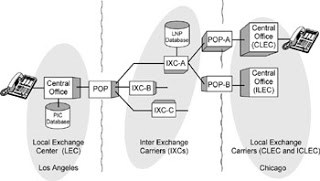Interexchange Carriers (IXCs) are the stalwarts of long-distance communication, playing a pivotal role in connecting different local exchange areas. Today’s IXCs are more than just long-distance voice providers; they are integral components of our global communication infrastructure, offering data services, internet access, and more. In this article, we will explore the evolution of IXCs from their inception to the modern digital age, examine how they are uniquely identified through Carrier Identification Codes (CICs), and delve into additional aspects that highlight their importance in contemporary telecommunications. Join us as we unravel the layers of IXC operations and their significance in keeping the world connected.
Table of Contents:
- What is an Interexchange Carrier?
- The Evolution of IXCs from the Internet’s Inception
- Carrier Identification Codes (CIC)
- The Impact of Regulatory Changes on IXCs
- References

1. What is an Interexchange Carrier?
An Interexchange Carrier (IXC) today is defined as a telecommunications company that provides long-distance voice and data services, bridging the gap between local exchange areas. These carriers operate vast networks, often comprising high-capacity, fiber-optic cables, and utilize advanced technologies like softswitches and Voice over Internet Protocol (VoIP) to manage and route inter-area communications efficiently. Their services extend beyond traditional voice calls to include data transmission, internet access, and video conferencing, catering to both residential and commercial customers.
IXCs are characterized by their ability to connect calls and data services across Local Access and Transport Areas (LATAs), which are the geographic domains designated for managing calls within or between local regions. They harness a combination of sophisticated network infrastructure, state-of-the-art switching facilities, and strategic partnerships to offer seamless connectivity. With the evolution of digital communication, IXCs have diversified their offerings to remain relevant in a market where consumers demand high-speed, reliable, and cost-effective communication solutions.

Today’s IXCs compete in a dynamic environment with a variety of other service providers, including Competitive Local Exchange Carriers (CLECs) and cable companies. This competitive landscape is driven by regulatory changes that have opened markets, allowing IXCs to offer local services and LECs to extend into long-distance offerings. The goal of an IXC is to ensure that regardless of distance or the local service area, individuals and businesses can communicate without interruption or significant expense.
2. The Evolution of IXCs from the Internet’s Inception
In the early days of the Internet, the role of IXCs was predominantly to provide long-distance voice communication services. They owned and managed the backbone of the telecommunication infrastructure, consisting of high-capacity fiber-optic lines crisscrossing nations. As the internet began to burgeon, IXCs were instrumental in laying the groundwork for what would become the superhighways of data communication.
Over the years, the landscape has drastically evolved. The advent of the World Wide Web and subsequent exponential increase in data traffic led IXCs to expand their services. The Telecommunications Act of 1996 was a significant milestone that deregulated the industry, allowing IXCs to enter local markets and vice versa. This opened the floodgates for innovation and competition, propelling IXCs to upgrade their infrastructures and embrace IP-based technologies.
Today, IXCs are at the forefront of digital transformation, providing not only voice but also broadband internet, VoIP, and cloud services. They have become essential in the architecture of global communications, ensuring connectivity and the seamless transfer of vast amounts of data across continents.
3. Carrier Identification Codes (CIC)
Carrier Identification Codes (CIC) are essential elements in the telecommunications ecosystem, serving as unique identifiers for carriers. A CIC is a four-digit number assigned to each carrier by the National Numbering Plan Administration. This code facilitates the routing of calls and data, allowing users to choose their preferred long-distance carrier. It was particularly relevant when the industry was heavily regulated, and users needed to specify their chosen IXC for long-distance services.
CICs are still used today to ensure that calls and data are accurately routed through the complex web of modern telecommunications networks. They serve as a testament to the organized and systematic approach that underpins the seemingly invisible processes enabling our daily communications. (see Carrier identification code FAQ)
4. The Impact of Regulatory Changes on IXCs
The introduction of number portability and the unbundling of network elements further democratized the industry, breaking down monopolies and fostering a competitive environment that spurred the growth of Internet services. As a result, IXCs expanded their offerings beyond traditional telephony to include broadband, wireless, and cloud-based solutions. This diversification was a strategic move to capture new revenue streams and to stay relevant in an industry where digital convergence was becoming the norm.
The shift towards a more competitive marketplace also led IXCs to invest in new infrastructure and technologies. The deployment of fiber-optic networks became widespread, providing the backbone for the high-speed internet and facilitating the emergence of new services like video streaming and VoIP. These advancements were not just limited to consumer services; they also enabled the growth of enterprise solutions such as virtual private networks (VPNs) and dedicated internet access (DIA), further cementing IXCs as integral to the corporate world.
Furthermore, IXCs began to explore partnerships and mergers to consolidate their market positions and to expand their global footprint. This era saw the rise of multinational telecommunications giants capable of providing a comprehensive suite of services on a scale previously unseen. Such collaborations allowed IXCs to deliver end-to-end solutions that transcended local and national boundaries, catering to the growing needs of globalized businesses and societies.
In the current landscape, IXCs continue to evolve, driven by advancements in 5G, edge computing, and the Internet of Things (IoT). The focus has shifted from merely providing connectivity to offering platforms and ecosystems that support a vast array of services and applications. They are now seen as enablers of the digital economy, essential for the functioning of modern smart cities, telemedicine, remote work, and a plethora of other digitally-driven domains.
5. References
Books
- “The Dynamics of Broadband Markets in Europe: Realizing the 2020 Digital Agenda” by Wolter Lemstra, et al.
- “The Master Switch: The Rise and Fall of Information Empires” by Tim Wu.
RFCs
Online Resources
- Federal Communications Commission (FCC): https://www.fcc.gov/
- International Telecommunication Union (ITU): https://www.itu.int/
- National Numbering Plan Administration: https://nationalnanpa.com/